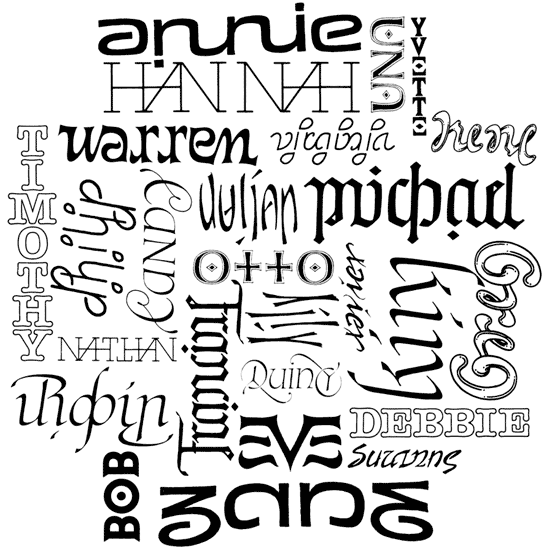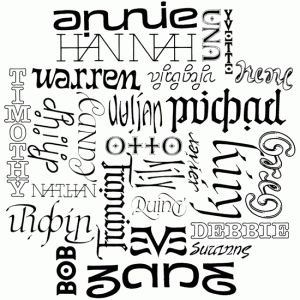
Meet Molly Coddle (and Other Words with “Personality”)

*Nor do I remember the point.
**Oh, that’s right. The point had something to do with him.
He has a, um, point. Who is Molly Coddle, and where, linguistically speaking, did she come from? The question also got me thinking (because, hey—that’s what I do to come up with word-related stuff for this weekly post!) of other name-filled words and phrases that many of us use all the time without realizing that there’s a person in there (or at least, a person’s name)!*
*For argument’s sake, I’m talking here about common first names that show up in words; I could write a completely separate post about just how many words we use that originate from the name of an actual, specific person—especially here in America (derived from Amerigo Vespucci, 1454-1512).
For example, it turns out that the “molly” in “mollycoddle,” emerging centuries ago as a pet form of the name Mary, was often used as disparaging slang for a weak or ineffectual man. Hence, to mollycoddle someone meant to treat him (or her) in the delicate fashion a “molly” must be “coddled.” In other words, like, really coddled. And while it sounds kind of antiquated, mollycoddle first appeared in English as a noun around 1833 and the verb form was in use by 1870.
Here then, are a few other common favorites I’ve come across. Feel free to share yours!
Johnny-come-lately
Since the early 1800s, “John” or “Johnny” (or “Johnnie”) has meant unspecified generic male (think “John Doe”). A Johnny-come-lately came to mean a brash newcomer or late-comer (duh), sort of the converse of “Johnny-on-the-spot” (who was always, humbly, right where–and when–you needed him most). It may have emerged in the 1890s as slang in the British Army, though even the Dictionary of Slang isn’t definite on that.By George!
Okay, so Americans don’t really say this, and I’m not sure the Brits do so much anymore either (unless they are a fictional detective or locution professor). Often thought to be a reference to St. George or King George, it probably alludes to just plain George—as a more family-friendly substitute for “Jesus!”Charlie horse
A painful leg cramp that everyone has probably had at some point, it is properly spelled “Charley horse”—if you accept the origin story as detailed in a 1907 article in the Washington Post. According to the piece, a pitcher named Charley Radbourne, nicknamed Old Hoss—ace starter for the Providence Grays and Boston Beaneaters!—had suffered this problem during a game in the 1880s; the condition became known as a “Charley Hoss,” then Charley horse (and/or Charlie horse).Bobsled
A form of track-based sled-racing popular in Jamaica and possibly other countries, the bobsled was, alas, not invented by somebody’s neighbor Bob, but possibly got its name from how the sled crew gained speed during their runs—i.e., they would bob back and forth to control the sled and increase its speed. Or, alternately, the name could refer to the “bobbed”—that is, shortened—nature of the sled, compared to traditional sleds and sleighs.Cup-of-Joe
Or just “Joe,” in reference to coffee. The best origin story I’ve found involves one Josephus Daniels, Secretray of the Navy, who allegedly banned alcohol on all U.S. naval vessels in 1914, forcing the sailors to settle for the next strongest substitute. However, that story is solidly debunked here. And the mystery continues.Lazy Susan
You know, it’s that rotatable platter that makes it a lot easier to share dim sum. There is no clear consensus as to the exact origin, though the first use (referring to a “dumbwaiter”) may have been in Good Housekeeping magazine in 1906. Some theories include a reference to a particularly slow waitress or a mistranslation or pronunciation from French (“laissez sous?”).Peeping Tom
Who’s Tom? Hmmm. Here’s one good story involving Lady Godiva.Scott-free
This one has less personality than I hoped. It’s a form of the original “scot-free,” which derives from the Old English scotfreo, meaning “exempt from Royal tax.” So I guess Scott gets away with this one…Willy-nilly
Nope, nothing to do with a friendly killer whale. According to the Online Etymology Dictionary, it originated in the 17th century as “a contraction of will I, nill I, or will he, nill he, or will ye, nill ye, lit. ‘with or without the will of the person concerned.’”Victor
Winner. A champion. The one who gets the spoils! Okay, this one doesn’t really count, since it was a word before it ever became a name—but I hope you’ll understand why, for personal reasons, I had to include it.











